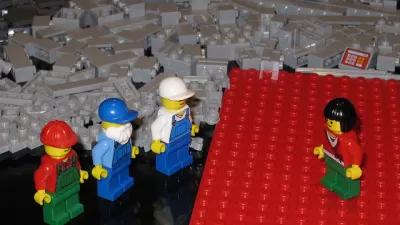What was promised as the tallest building in the world built by modular construction is delayed and the subject of lawsuits. State documents, recently made public, describe water damage, tolerance challenges, and unanticipated repairs.
The Atlantic Yards apartment tower known as B2 officially launched in December 2012 with great fanfare and high hopes, and not just because of what developer Forest City Ratner proposed to build: 32 stories housing 363 apartments, half of them affordable. It was that B2, nearly flush to the Barclays Center, would be the world's tallest modular tower, with its flooring, fixtures, appliances, and facades delivered within a metal-framed chassis some 10' high, 15' wide, and 30' long. Forest City said it had "cracked a code" and claimed an "iPhone moment".
Two additional Atlantic Yards towers would start within the next 12 to 18 months, among the 6,430 apartments—2,250 of them below-market—planned for the project, all to be built modular. B2's 930 mods—which Forest City CEO MaryAnne Gilmartin likened to "shrink-wrapped apartments—would be made at a new factory at the Brooklyn Navy Yard. The first mods arrived at Dean Street and Flatbush Avenue in December 2013 with a proud "Made in Brooklyn" wrapping.
B2's pioneering approach was seen as more than just an intriguing development at the highly contested Atlantic Yards site. Its designers and admirers thought the modular method might lower the cost of affordable housing, creating a new model for high-rise, union built apartments.
Today, the reality of B2 has not matched the anticipation. The building—delayed, stalled, and since re-started to reach half its ultimate height—will take more than twice as long as promised and cost far more than projected. B2, also known as 461 Dean Street, remains mired in lawsuits filed by Forest City and its former partner Skanska, with dueling charges of incompetent execution and flawed design.
While Forest City Chairman Bruce Ratner in July 2014 claimed on NY 1 that modular "worked out technically perfectly," with delays the only problem, state documents acquired via a Freedom of Information Law (FOIL) request paint a more ominous picture. Half of the first 39 apartments suffered significant water damage. The first four floors were "largely gutted," according to reports from consultant STV, which serves as owner's representative for Empire State Development (ESD), the state agency overseeing/shepherding the entire Atlantic Yards project, which has been renamed Pacific Park Brooklyn.
The builders got so skittish that, on the 9th and 10th floors, drywall sections of the ceilings and walls closest to the windows were omitted from mods, to be installed later, undermining the concept of completing as much as possible in the factory.
FULL STORY: Documents Reveal Woes at Pioneering Atlantic Yards Building

Alabama: Trump Terminates Settlements for Black Communities Harmed By Raw Sewage
Trump deemed the landmark civil rights agreement “illegal DEI and environmental justice policy.”

Study: Maui’s Plan to Convert Vacation Rentals to Long-Term Housing Could Cause Nearly $1 Billion Economic Loss
The plan would reduce visitor accommodation by 25% resulting in 1,900 jobs lost.

Why Should We Subsidize Public Transportation?
Many public transit agencies face financial stress due to rising costs, declining fare revenue, and declining subsidies. Transit advocates must provide a strong business case for increasing public transit funding.

Wind Energy on the Rise Despite Federal Policy Reversal
The Trump administration is revoking federal support for renewable energy, but demand for new projects continues unabated.

Passengers Flock to Caltrain After Electrification
The new electric trains are running faster and more reliably, leading to strong ridership growth on the Bay Area rail system.

Texas Churches Rally Behind ‘Yes in God’s Back Yard’ Legislation
Religious leaders want the state to reduce zoning regulations to streamline leasing church-owned land to housing developers.
Urban Design for Planners 1: Software Tools
This six-course series explores essential urban design concepts using open source software and equips planners with the tools they need to participate fully in the urban design process.
Planning for Universal Design
Learn the tools for implementing Universal Design in planning regulations.
Caltrans
Smith Gee Studio
Institute for Housing and Urban Development Studies (IHS)
City of Grandview
Harvard GSD Executive Education
Toledo-Lucas County Plan Commissions
Salt Lake City
NYU Wagner Graduate School of Public Service



























